 | TODAY IN SCIENCE HISTORY NEWSLETTER - 17 MAY |
| Feature for Today |
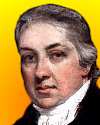 On 17 May 1749, Edward Jenner was born, the English surgeon who discovered the method of vaccination for smallpox. On 17 May 1749, Edward Jenner was born, the English surgeon who discovered the method of vaccination for smallpox.His interest was initiated by hearing tales of milkmaids who had caught the cowpox being immune from smallpox. Thus, he began by investigating cowpox. He self-published the results of his study as An Inquiry Into the Causes and Effects of...the Cow Pox (1798). By following the link, which is to an abridged version, you again have a chance to wonder, or be impressed, or feel a quiet excitement, as you read the actual words of one of medicine's great researchers. |
| Book of the Day | |
| |
| Quotations for Today | |
 | "While the vaccine discovery was progressive, the joy I felt at the prospect before me of being the instrument destined to take away from the world one of its greatest calamities [smallpox], blended with the fond hope of enjoying independence and domestic peace and happiness, was often so excessive that, in pursuing my favourite subject among the meadows, I have sometimes found myself in a kind of reverie." |
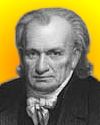 | "Geology has its peculiar difficulties, from which all other sciences are exempt. Questions in chemistry may be settled in the laboratory by experiment. Mathematical and philosophical questions may be discussed, while the materials for discussion are ready furnished by our own intellectual reflections. Plants, animals and minerals, may be arranged in the museum, and all questions relating to their intrinsic principles may be discussed with facility. But the relative positions, the shades of difference, the peculiar complexions, whether continuous or in subordinate beds, are subjects of enquiry in settling the character of rocks, which can be judged of while they are in situ only." |
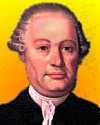 | "I here present the reader with a new sign which I have discovered for detecting diseases of the chest. This consists in percussion of the human thorax, whereby, according to the character of the particular sounds then elicited, an opinion is formed of the internal state of that cavity." |
| QUIZ | |
| Before you look at today's web page, see if you can answer some of these questions about the events that happened on this day. Some of the names are very familiar. Others will likely stump you. Tickle your curiosity with these questions, then check your answers on today's web page. | |
| Births | |
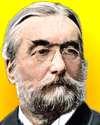 |  Sir Joseph Norman Lockyer, born 17 May 1836, in 1868 discovered and named the element helium that he found in the Sun's atmosphere before it had been detected on Earth. He also applied the name chromosphere for the sun's outer layer. He discovered, together with P. J. Janssen, the prominences (red flames) that surround the solar disk. He was also interested in the classification of stellar spectra and developed the meteoric hypothesis of stellar evolution. He was the founding editor of a scientific journal that is still being published. Sir Joseph Norman Lockyer, born 17 May 1836, in 1868 discovered and named the element helium that he found in the Sun's atmosphere before it had been detected on Earth. He also applied the name chromosphere for the sun's outer layer. He discovered, together with P. J. Janssen, the prominences (red flames) that surround the solar disk. He was also interested in the classification of stellar spectra and developed the meteoric hypothesis of stellar evolution. He was the founding editor of a scientific journal that is still being published. What is the name of the journal of which he was the Founder Editor? What is the name of the journal of which he was the Founder Editor? |
 |  Edward Jenner (1749-1823) was an English surgeon and discoverer of vaccination for smallpox. There was a common story among farmers that if a person contracted a relatively mild and harmless disease of cattle called cowpox, immunity to smallpox would result. On 14 May 1796 he removed the fluid of a cowpox from dairymaid Sarah Nelmes, and inoculated James Phipps, an eight-year-old boy, who soon came down with cowpox. Six weeks later, he inoculated the boy with smallpox. The boy remained healthy, proving the theory. He called his method vaccination. Jenner also introduced the word virus. Edward Jenner (1749-1823) was an English surgeon and discoverer of vaccination for smallpox. There was a common story among farmers that if a person contracted a relatively mild and harmless disease of cattle called cowpox, immunity to smallpox would result. On 14 May 1796 he removed the fluid of a cowpox from dairymaid Sarah Nelmes, and inoculated James Phipps, an eight-year-old boy, who soon came down with cowpox. Six weeks later, he inoculated the boy with smallpox. The boy remained healthy, proving the theory. He called his method vaccination. Jenner also introduced the word virus. Can you explain the origin of his word vaccination? Can you explain the origin of his word vaccination? |
| Deaths | |
| |  G. Evelyn Hutchinson (1903-1991) was an English-born American zoologist known as the "father of modern limnology" for his ecological studies. G. Evelyn Hutchinson (1903-1991) was an English-born American zoologist known as the "father of modern limnology" for his ecological studies. As a limnologist, what did he study? As a limnologist, what did he study? |
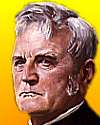 |  John Deere (1804-1886) was a pioneer American inventor and manufacturer. John Deere (1804-1886) was a pioneer American inventor and manufacturer. What was this man's field of invention? What was this man's field of invention? |
| Events | |
 On 17 May 1979, the highest voltage ever generated, was produced by the National Electrostatics Corporation, Oak Ridge, Tenn. On 17 May 1979, the highest voltage ever generated, was produced by the National Electrostatics Corporation, Oak Ridge, Tenn. To the nearest power of ten, what was this voltage? To the nearest power of ten, what was this voltage? | |
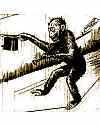 |  On a certain 17 May, the governor of Tennessee signed into law the repeal of the 1925 state law prohibiting the teaching of evolution. The original law had made it "unlawful for any teacher in any of the Universities, Normals and all other public schools of the State which are supported in whole or in part by the public school funds of the State, to teach any theory that denies the story of the Divine Creation of man as taught in the Bible, and to teach instead that man has descended from a lower order of animals." It was this law that was tested in what became known as the "Scopes monkey trial." Scopes was found guilty, but acquitted on a technicality upon appeal. On a certain 17 May, the governor of Tennessee signed into law the repeal of the 1925 state law prohibiting the teaching of evolution. The original law had made it "unlawful for any teacher in any of the Universities, Normals and all other public schools of the State which are supported in whole or in part by the public school funds of the State, to teach any theory that denies the story of the Divine Creation of man as taught in the Bible, and to teach instead that man has descended from a lower order of animals." It was this law that was tested in what became known as the "Scopes monkey trial." Scopes was found guilty, but acquitted on a technicality upon appeal. In what decade was this law repealed? In what decade was this law repealed? |
| |  On 17 May 1912, the London newspaper, The Times, reported that new experimental equipment was in place at Epsom, to be tested in the afternoon of the following day. This, the first of its kind in Great Britain, provided 320 Epsom people the ability to do for themselves something they had previously depended on another person to do for them. On 17 May 1912, the London newspaper, The Times, reported that new experimental equipment was in place at Epsom, to be tested in the afternoon of the following day. This, the first of its kind in Great Britain, provided 320 Epsom people the ability to do for themselves something they had previously depended on another person to do for them. What was the equipment? What was the equipment? |
| Answers |
When you have your answers ready to all the questions above, you'll find all the information to check them, and more, on the May 17 web page of Today in Science History. Or, try this link first for just the brief answers. Fast answers for the previous newsletter for May 16: They had superconductivity at temperatures higher than had previously been thought attainable; chromium and beryllium; (Jean-Baptiste-)Joseph Fourier; root beer; very large, cylindrical bombs rotating backwards at high speed, dropped at the right height and place, skipped along the surface of the water, right up to the base of the dam, like skipping stones on a pond; the decade including the year 1988. |
| Feedback |
 If you enjoy this newsletter, the website, or wish to offer encouragement or ideas, please send feedback by using your mail reader Reply button. If you enjoy this newsletter, the website, or wish to offer encouragement or ideas, please send feedback by using your mail reader Reply button. |
--
If you do not want to receive any more newsletters, Unsubscribe
To update your preferences and to unsubscribe visit this link


Δεν υπάρχουν σχόλια:
Δημοσίευση σχολίου